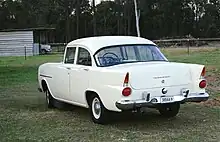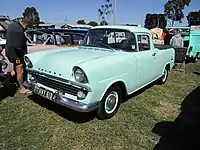Holden FB
The Holden FB is an automobile produced by Holden in Australia from 1960 to 1961.[2] Introduced on 14 January 1960,[1] the FB series replaced the Holden FC range.[2]
| Holden FB | |
|---|---|
_Station_Sedan_station_wagon_(2015-07-15)_01.jpg.webp) Holden Special Station Sedan | |
| Overview | |
| Manufacturer | Holden (General Motors) |
| Also called | Holden Standard Holden Special Holden Utility Holden Panel Van |
| Production | January 1960 – May 1961 |
| Designer | Alf Payze |
| Body and chassis | |
| Body style | 4-door sedan 5-door station wagon 2-door coupé utility 2-door panel van |
| Layout | FR layout |
| Powertrain | |
| Engine | 2.3L GMH '138' I6 |
| Transmission | 3-speed manual[1] |
| Dimensions | |
| Wheelbase | 105.0 inches (2667 mm)[1] |
| Length | 181.5 inches (4610 mm)[1] |
| Width | 67.0 inches (1703 mm)[1] |
| Height | 60.0 inches (1521 mm)[1] |
| Curb weight | Standard Sedan: 2473 lb (1122 kg)[1] |
| Chronology | |
| Predecessor | Holden FC |
| Successor | Holden EK |
Model range
The FB range consisted of four-door sedans in two trim levels, five-door station wagons in two trim levels,[3] a two-door coupe utility and a two-door panel van.[4] The six models were marketed as follows:
- Holden Standard Sedan[3]
- Holden Standard Station Sedan[3]
- Holden Special Sedan[3]
- Holden Special Station Sedan[3]
- Holden Utility[4]
- Holden Panel Van[4]
The Holden Business Sedan, which had been marketed as part of the FC range, was not carried over to the FB series.[2]
 Holden Standard Sedan
Holden Standard Sedan.jpg.webp) Holden Standard Station Sedan
Holden Standard Station Sedan.jpg.webp) Holden Special Sedan
Holden Special Sedan_Station_Sedan_station_wagon_(2015-07-15)_02.jpg.webp) Holden Special Station Sedan
Holden Special Station Sedan Holden Utility
Holden Utility.jpg.webp) Holden Utility
Holden Utility.jpg.webp) Holden Panel Van
Holden Panel Van.jpg.webp) Holden Panel Van
Holden Panel Van
Changes
The FB was promoted as being longer, lower, more spacious and more powerful than the FC model, but in reality it was only slightly so on each count.[5] Overall length was 5.5 inches (140 mm) greater, although the wheelbase remained the same.[5] The engine bore was still 3 inches (76 mm), the last model with that specification. Engine capacity remained at 132 cubic inches (2.16 L) but the compression ratio was raised. However, the resulting extra 4 brake horsepower (3 kW) of power did not compensate for the greater weight of the FB, so performance was inferior to that of its predecessor.[6] Changes were also made to the brakes, front coil springs, air cleaner and clutch.[2]
Obvious styling differences were the lower bonnet, finned rear mudguards with new taillights (on the sedans and wagons only) and a wrap-around windscreen.[5] Seating was improved, as was the instrument panel.[5]
Notably, the FB was the first Holden model to also be produced in left-hand drive form, those vehicles being destined for export markets.[2]
Engines
All FB models were powered by a 132-cubic-inch (2.16 L) inline six-cylinder engine, the last to have the 3-inch (76 mm) bore size, producing 75 brake horsepower (56 kW).[6]
Production and replacement
After a production run of 147,747 vehicles,[1] the FB was replaced by the Holden EK series in May 1961.[7]
References
- Holden FB Specifications Retrieved from www.uniquecarsandparts.com.au on 15 October 2009
- Holden FB Retrieved from www.uniquecarsandparts.com.au on 15 October 2009
- ”Holden, Australia’s Own Car” (GMH sales brochure for Holden FB Sedans and Station Sedans)
- ”Holden, Australia’s Own Utility, Australia’s Own Panel Van” (GMH sales brochure for Holden FB Utility and Panel Van)
- Tony Davis, Aussie Cars, 1987, page 78
- Original Genuine GMH Factory Workshop Manual
- Holden Heritage Part 1 Archived 24 August 2009 at the Wayback Machine Retrieved from media.gm.com on 15 October 2009
Further reading
- Norm Darwin, 100 Years of GM in Australia, 2002, pages 230–231
- Norm Darwin, The history of Holden since 1917, 1983
- The Sixties Holden Archive – Holden FB Retrieved from members.tripod.com on 15 October 2009